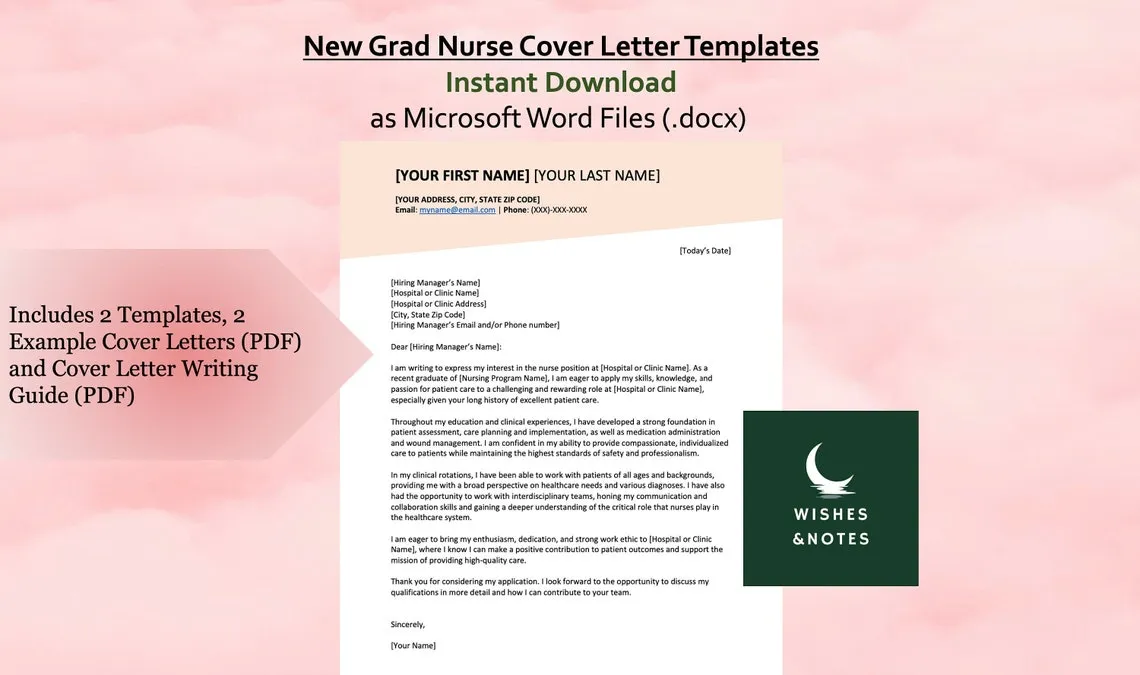What is a New Grad Nurse Cover Letter
A new graduate nurse cover letter is a crucial document that accompanies your resume when applying for nursing positions. It serves as your introduction to the hiring manager, providing an opportunity to showcase your personality, skills, and qualifications beyond what’s listed in your resume. It’s your chance to make a strong first impression and demonstrate why you’re the ideal candidate for the job. The cover letter allows you to highlight your passion for nursing, your relevant experiences (even if limited), and your career goals. It should be tailored to each specific job application, emphasizing the skills and experiences that align with the employer’s needs. A well-crafted cover letter significantly increases your chances of getting an interview and landing your first nursing job.
Why You Need a Standout Cover Letter
In a competitive job market, especially for new graduate nurses, a standout cover letter is essential. It’s your opportunity to differentiate yourself from other applicants and make a lasting impression. A generic cover letter won’t cut it; you need to demonstrate genuine interest in the specific role and the healthcare facility. A well-written cover letter provides the context for your resume, explaining your motivations and career aspirations. It allows you to address any potential gaps in your experience and highlight your transferable skills. Additionally, a cover letter allows you to showcase your communication skills, which are vital in nursing. A strong cover letter isn’t just about listing your qualifications; it’s about telling a compelling story that convinces the hiring manager that you’re the right fit.
Key Components of a New Grad Nurse Cover Letter
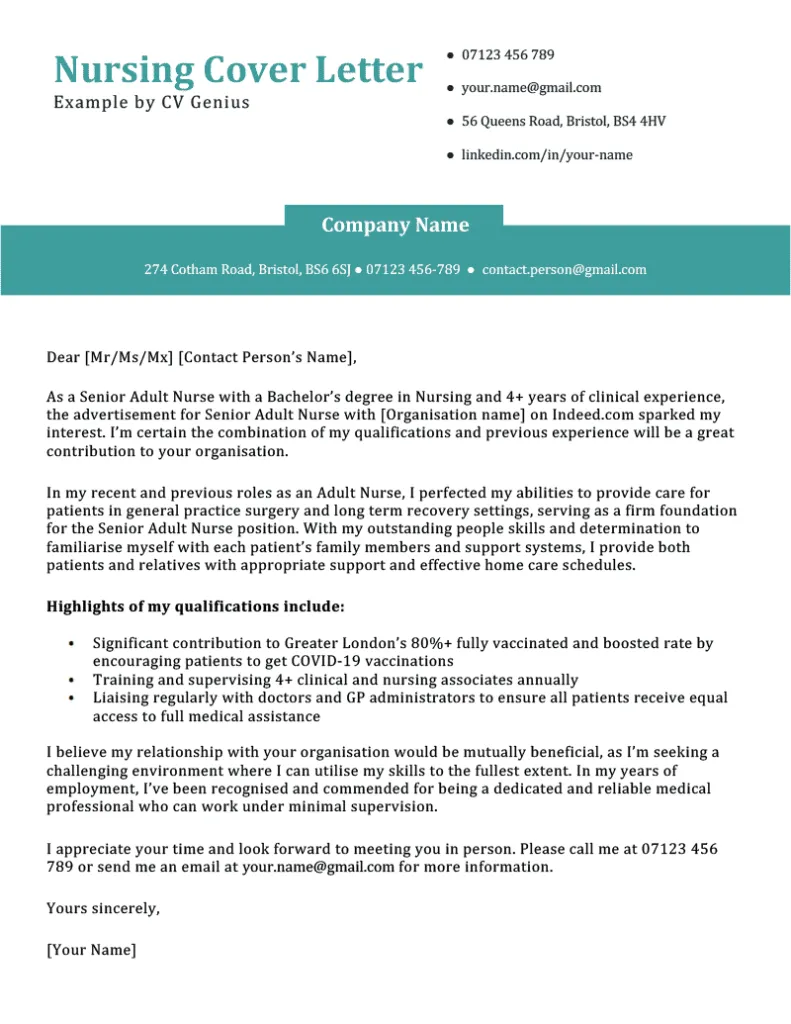
A successful cover letter comprises several key elements. Each section plays a vital role in creating a compelling narrative that highlights your suitability for the nursing position. Understanding these components and how to effectively incorporate them is essential for crafting a cover letter that captures the attention of hiring managers and sets you apart from other applicants. From the essential contact details to the closing call to action, each part contributes to the overall effectiveness of your application. You must ensure a cohesive and impactful presentation, demonstrating professionalism, and a clear understanding of the role and the healthcare environment.
Your Contact Information
At the top of your cover letter, provide your full name, phone number, email address, and optionally, your LinkedIn profile URL. This information ensures the hiring manager can easily reach you. Ensure your email address is professional (e.g., firstname.lastname@email.com) and your voicemail greeting is professional as well.
The Hiring Manager’s Information
Address the letter to the hiring manager or the specific person listed in the job posting. If you can’t find a name, use a professional title such as ‘Hiring Manager’ or ‘Nurse Recruitment Team’. Researching this information demonstrates your attention to detail and genuine interest in the position. It is very important to address the correct person as it makes your application personal and shows you care to write each application individually.
The Salutation
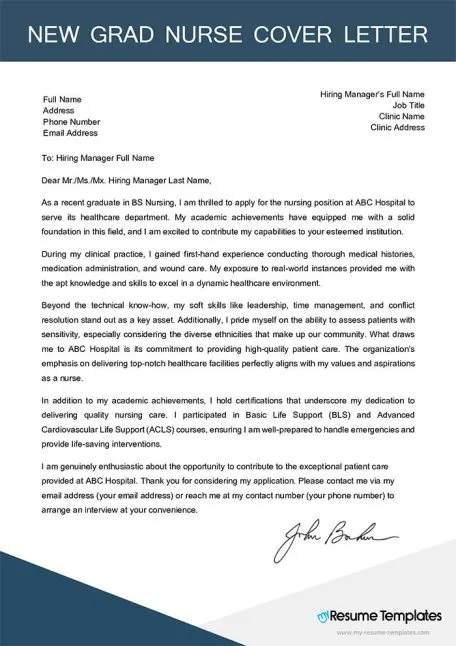
Use a formal salutation, such as ‘Dear Mr./Ms./Mx. [Last Name]’ or ‘Dear Hiring Manager’. Avoid informal greetings like ‘Hello’ or ‘Hi’. This sets a professional tone from the start and shows respect for the recipient. Use the correct name and title to demonstrate professionalism.
Writing a Compelling Opening
Start with a strong opening paragraph that grabs the reader’s attention. State the position you’re applying for and briefly explain why you’re interested. Mention where you saw the job posting. Highlight your passion for nursing and your enthusiasm for the specific opportunity. This opening should immediately convey your interest and make the reader want to continue reading.
Highlighting Your Education
Briefly mention your nursing education, including your degree, the name of your school, and your graduation date. If you have any academic achievements, such as honors or a high GPA (if it’s above average), include them. This section showcases your foundational knowledge and academic accomplishments. You can also briefly mention any relevant coursework or specializations that align with the job requirements. Remember to be concise and focused on what’s most relevant.
Showcasing Clinical Experience
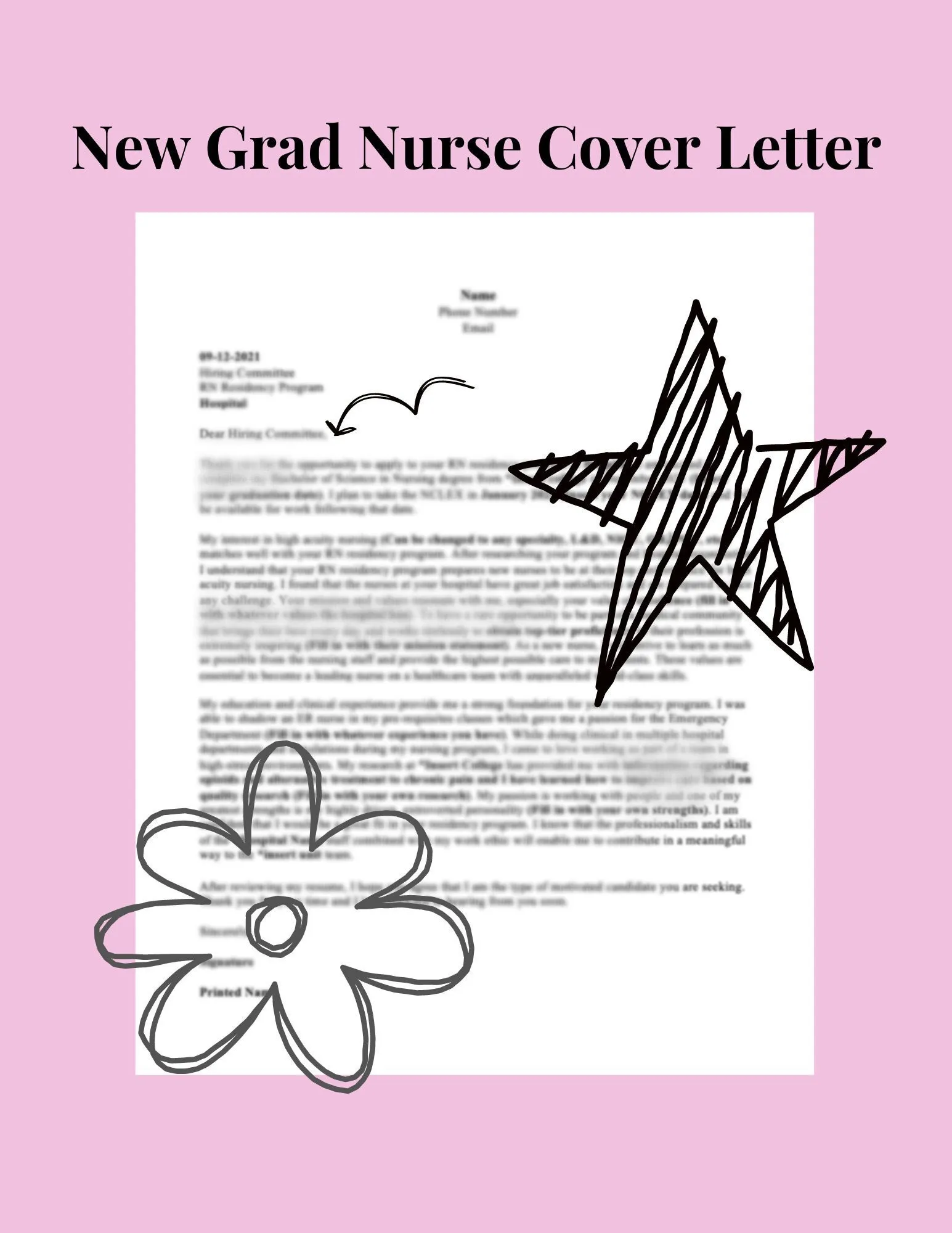
Even as a new grad, you likely have clinical experience from your nursing program. Highlight these experiences, mentioning the units you worked in, the types of patients you cared for, and the specific skills you developed. Quantify your accomplishments whenever possible (e.g., ‘Assisted in the care of 15+ patients daily’). This section is crucial for demonstrating your practical skills and abilities in a real-world setting. Use action verbs to describe your responsibilities and achievements.
Emphasizing Skills and Qualifications
Identify the key skills and qualifications the employer is seeking in the job description and tailor your letter to match. Highlight relevant skills such as patient assessment, medication administration, critical thinking, communication, and teamwork. Give specific examples of how you’ve demonstrated these skills in your clinical experiences. This section demonstrates you understand the job requirements and possess the skills necessary to succeed in the role. Use keywords from the job description to make your application stand out.
Demonstrating Passion for Nursing
Express your passion for nursing and what motivates you to pursue this career. Explain your interest in the specific area of nursing or the healthcare facility you’re applying to. Share a personal anecdote or a brief story that demonstrates your commitment to patient care. This section adds a personal touch and shows the hiring manager that you genuinely care about the profession. It makes you more relatable and memorable.
Expressing Your Career Goals
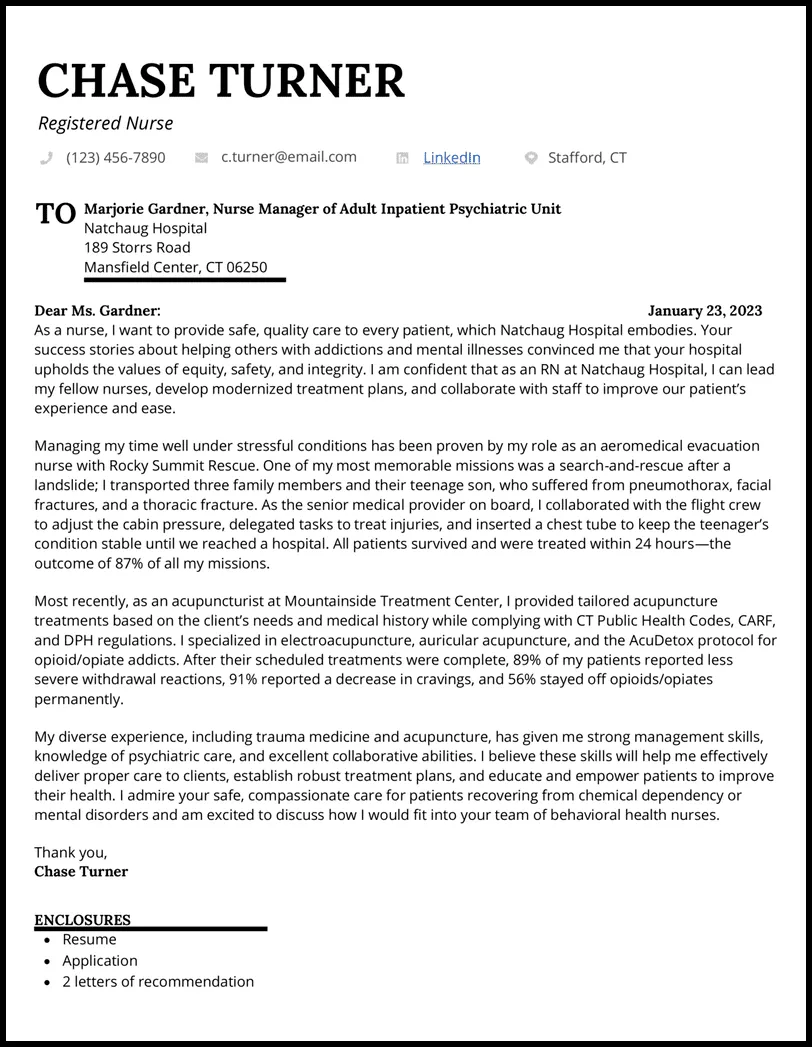
Briefly state your career goals and how this position aligns with them. Show that you have a plan for your professional development and that you see this opportunity as a step toward achieving your long-term goals. This demonstrates your ambition and your commitment to your career. This shows the employer that you are not just looking for any job, but one that helps you grow.
The Call to Action
End your cover letter with a call to action. Express your interest in an interview and state that you’re available to discuss your qualifications further. Thank the hiring manager for their time and consideration. This demonstrates your proactive approach and makes it easier for the hiring manager to take the next step. Providing contact details again is also a good practice.
Closing the Letter
Use a professional closing, such as ‘Sincerely’ or ‘Best regards’, followed by your full name. Ensure your closing is consistent with the tone of your letter. This signals the end of the letter in a professional and respectful manner. This final touch is essential for maintaining a professional and polished presentation.
Formatting Your Cover Letter
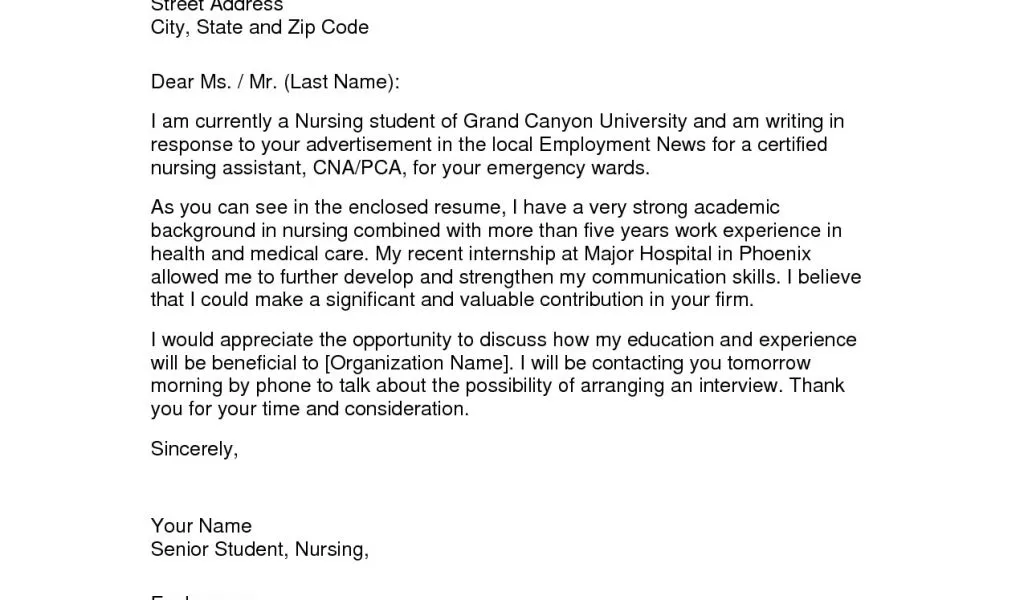
Proper formatting is crucial for making your cover letter easy to read and visually appealing. It shows you’ve paid attention to detail and that you respect the hiring manager’s time. Effective formatting makes your cover letter more accessible and impactful, ensuring your message is clearly communicated.
Choosing the Right Font and Size
Use a professional and easy-to-read font, such as Times New Roman, Arial, or Calibri. Keep the font size between 10 and 12 points. A clean and legible font ensures the hiring manager can read your letter without difficulty. Avoid using overly decorative fonts, which can be distracting and unprofessional. A consistent and readable font shows attention to detail.
Margins and Spacing
Use standard 1-inch margins on all sides of your cover letter. Double-space between paragraphs for readability. Proper spacing enhances readability and makes the letter look neat and organized. This prevents the letter from appearing cluttered and ensures the hiring manager can easily scan the content.
Proofreading and Editing
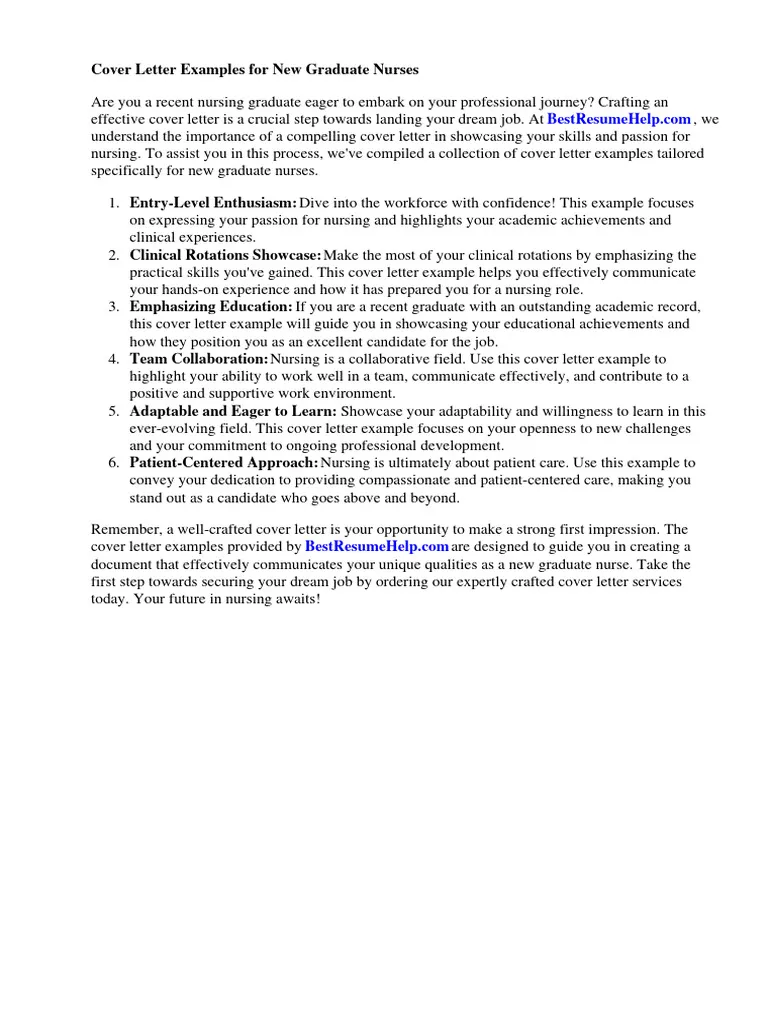
Thoroughly proofread your cover letter for any grammatical errors, spelling mistakes, or typos. Have a friend or mentor review it as well, as a fresh pair of eyes can often catch mistakes you might miss. Errors can undermine your credibility, so it’s essential to present a flawless document. Correct grammar and spelling show professionalism and attention to detail, which are critical qualities for nurses.
Examples of New Grad Nurse Cover Letters
Reviewing examples can provide valuable guidance in structuring your cover letter and understanding the language used. Analyzing different examples can offer insights into effectively conveying your skills and experiences. Seeing well-crafted cover letters can inspire you to tailor your letter to your specific circumstances and the job requirements. You can adapt the examples to fit your background and the positions you are applying for.
Example 1 General Cover Letter
This example can be used when applying for a general nursing position. It focuses on highlighting your foundational nursing skills and your enthusiasm to learn and grow in the field. This type of letter is suitable when the job description doesn’t specify a particular specialty or unit.
Example 2 Cover Letter with Volunteering
If you have significant volunteering experience, particularly in a healthcare setting, this example is appropriate. It highlights your compassion, dedication to patient care, and relevant skills gained through volunteering. This emphasizes your commitment to helping others and your preparation for a career in nursing.
Example 3 Cover Letter with Specialization
If you have a specific interest or experience in a particular nursing specialty (e.g., pediatrics, critical care), tailor your cover letter accordingly. This example focuses on your specific skills and knowledge related to the specialty. This can be especially helpful if you have completed a clinical rotation or have taken relevant coursework. This highlights your focused expertise and career interests.
Tips for Success
Beyond the basic components and formatting, several strategies can improve the effectiveness of your cover letter. Taking these steps can significantly boost your chances of securing an interview and, ultimately, a job offer. Effective cover letters require strategic approaches and careful planning to make a lasting impact. From tailoring your letter to the specific job requirements to researching the organization, these tips offer practical advice for creating a successful cover letter.
Tailoring Your Letter to the Job
Customize your cover letter for each job application. Read the job description carefully and identify the key skills, qualifications, and experiences the employer is seeking. Highlight your relevant experiences and skills by using the same keywords and phrases from the job description. Generic cover letters are easily identified and often discarded. Tailoring your letter demonstrates that you’ve taken the time to understand the specific needs of the employer.
Researching the Hospital or Clinic
Research the healthcare facility you’re applying to. Understand their mission, values, and recent accomplishments. Mentioning specific programs or initiatives that align with your interests demonstrates your genuine interest in the organization. This shows that you’ve taken the time to understand their environment. This also helps you demonstrate that you’re a good fit for their culture.
Highlighting Relevant Keywords
Use keywords from the job description throughout your cover letter. This helps your application get past applicant tracking systems (ATS) and ensures that your application is noticed by the hiring manager. Incorporating relevant keywords also shows that you understand the job requirements and are familiar with the industry terminology. Make sure your keywords fit naturally within your writing style.
Following Up on Your Application
Follow up with the hiring manager or recruiter within a week or two of submitting your application. This shows your continued interest and initiative. A brief email or phone call expressing your interest and asking about the status of your application is appropriate. Following up can help you stay top of mind and demonstrate your enthusiasm.
